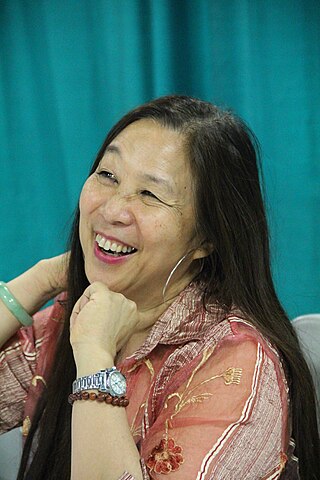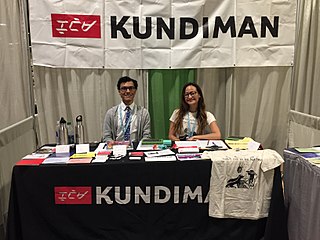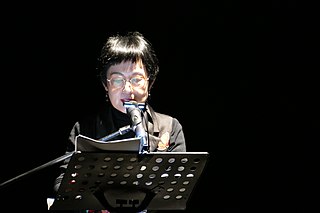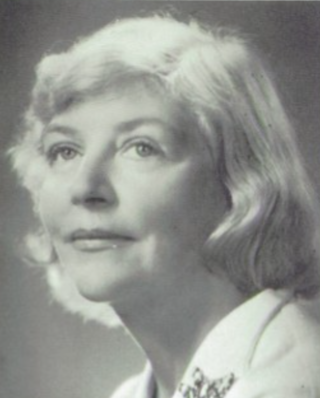The Language poets are an avant-garde group or tendency in United States poetry that emerged in the late 1960s and early 1970s. The poets included: Bernadette Mayer, Leslie Scalapino, Stephen Rodefer, Bruce Andrews, Charles Bernstein, Ron Silliman, Barrett Watten, Lyn Hejinian, Tom Mandel, Bob Perelman, Rae Armantrout, Alan Davies, Carla Harryman, Clark Coolidge, Hannah Weiner, Susan Howe, James Sherry, and Tina Darragh.
Lyn Hejinian was an American poet, essayist, translator, and publisher. She is often associated with the Language poets and is known for her landmark work My Life, as well as her book of essays, The Language of Inquiry.

Li-Young Lee is an American poet. He was born in Jakarta, Indonesia, to Chinese parents. His maternal great-grandfather was Yuan Shikai, China's first Republican President, who attempted to make himself emperor. Lee's father, who was a personal physician to Mao Zedong while in China, relocated his family to Indonesia, where he helped found Gamaliel University. In 1959 the Lee family fled Indonesia to escape widespread anti-Chinese sentiment and after a five-year trek through Hong Kong and Japan, they settled in the United States in 1964. Li-Young Lee attended the University of Pittsburgh, the University of Arizona, and the State University of New York Brockport.

Albert James Young was an American poet, novelist, essayist, screenwriter, and professor. He was named Poet Laureate of California by Governor Arnold Schwarzenegger from 2005 to 2008. Young's many books included novels, collections of poetry, essays, and memoirs. His work appeared in literary journals and magazines including Paris Review, Ploughshares, Essence, The New York Times, Chicago Review, Seattle Review, Brilliant Corners: A Journal of Jazz & Literature, Chelsea, Rolling Stone, Gathering of the Tribes, and in anthologies including the Norton Anthology of African American Literature, and the Oxford Anthology of African American Literature.
Norma Cole is a Canadian poet, visual artist, translator, and curator. An Anglophone Canadian by birth, Cole learned French at an early age, and went on to translate the works of French poets Emmanuel Hocquard, Danielle Collobert, Fouad Gabriel Naffah, Jean Daive, and others with whom she is intellectually allied. In the late 1970s and 1980s Cole was a member of the San Francisco-based circle of poets congregating around Robert Duncan. Her papers are collected at the Archive for New Poetry at the Mandeville Special Collections Library, University of California San Diego.
Aaron Shurin is an American poet, essayist, and educator. He is the former director of the Master of Fine Arts in Writing Program at the University of San Francisco, where he is now Professor Emeritus.
Ed Bok Lee is an American poet and writer. He is the author of three books of poetry, including Mitochondrial Night (2019), Whorled, the recipient of a 2012 American Book Award and a 2012 Minnesota Book Award in Poetry, and Real Karaoke People, the recipient of a 2006 PEN/Open Book Award and a 2006 Asian American Literary Award.

Meena Alexander was an Indian American poet, scholar, and writer. Born in Allahabad, India, and raised in India and Sudan, Alexander later lived and worked in New York City, where she was a Distinguished Professor of English at Hunter College and the CUNY Graduate Center.
Hisaye Yamamoto was an American author known for the short story collection Seventeen Syllables and Other Stories, first published in 1988. Her work confronts issues of the Japanese immigrant experience in America, the disconnect between first and second-generation immigrants, as well as the difficult role of women in society.

Marilyn Chin (陈美玲) is a prominent Chinese American poet, writer, activist, and feminist, as well as an editor and Professor of English. She is well-represented in major canonical anthologies and textbooks and her work is taught all over the world. Marilyn Chin's work is a frequent subject of academic research and literary criticism. Marilyn Chin has read her poetry at the Library of Congress.

Diana Chang was a Chinese American novelist and poet. She is best known for her novel The Frontiers of Love, one of the earliest novels by an Asian American woman. She is considered to be the first American-born Chinese to publish a novel in the United States.

Lorna Dee Cervantes is an American poet and activist, who is considered one of the greatest figures in Chicano poetry. She has been described by Alurista as "probably the best Chicana poet active today."

Kundiman is a nonprofit organization for writers and readers of Asian American literature. The organization offers an annual writing retreat, readings, workshops, a mentorship program, and a poetry prize. Kundiman was co-founded in 2004 by Asian American poets Sarah Gambito and Joseph O. Legaspi, and has received support from the National Endowment for the Arts, the New York City Department of Cultural Affairs, the Poetry Foundation, the New York Community Trust, Philippine American Writers, PAWA, and individuals.

Kim Hyesoon (Korean: 김혜순) is a South Korean poet. She was the first woman poet to receive the Kim Su-yeong Literature Award, Midang Literary Award, Contemporary Poetry Award, and Daesan Literary Awards. She has also received the Griffin Poetry Prize (2019), the Cikada Prize, the Samsung Ho-Am Prize in the Arts (2022), U.K Royal Society of Literature International writer (2022), and National Book Critics Circle Award for Poetry. She is the first foreign poet laureate who won the award
Stephen Owen is an American sinologist specializing in Chinese literature, particularly Tang dynasty poetry and comparative poetics. He taught Chinese literature and comparative literature at Harvard University and is James Bryant Conant University Professor, Emeritus; becoming emeritus before he was one of only 25 Harvard University Professors. He is a member of the American Academy of Arts and Sciences and the American Philosophical Society.
Nightboat Books is an American nonprofit literary press founded in 2004 and located in Brooklyn, New York. The press publishes poetry, fiction, essays, translations, and intergenre books.

Craig Santos Perez is a poet, essayist, university professor, American publisher (USA) from the Chamorro people, born in Mongmong-Toto-Maite, Guam Island. His poetry has received multiple awards, including the 2023 National Book Award, a 2015 American Book Award and the 2011 PEN Center USA Literary Award for Poetry.
Doris Davenport, sometimes styled as doris davenport, is a writer, educator, and literary and performance poet. She wrote an essay featured in This Bridge Called My Back: Writings by Radical Women of Color entitled "The Pathology of Racism: A Conversation with Third World Wimmin." She also focuses her efforts on poetry and education.

Liselott Margarete "Lisa" Kahn was a German-American poet and scholar of psychology and German studies. She studied at the University of Heidelberg, where she obtained a PhD in psychology in 1953. She married the German-American scholar Robert L. Kahn and emigrated to the United States, where she was a teacher at The Kinkaid School from 1964 to 1968 and professor of German at Texas Southern University from 1968 to 1990, serving as head of the foreign language department from 1988.









